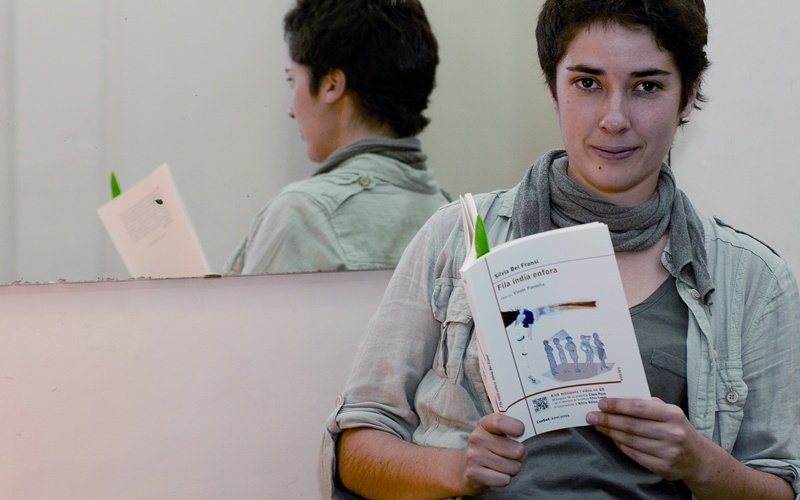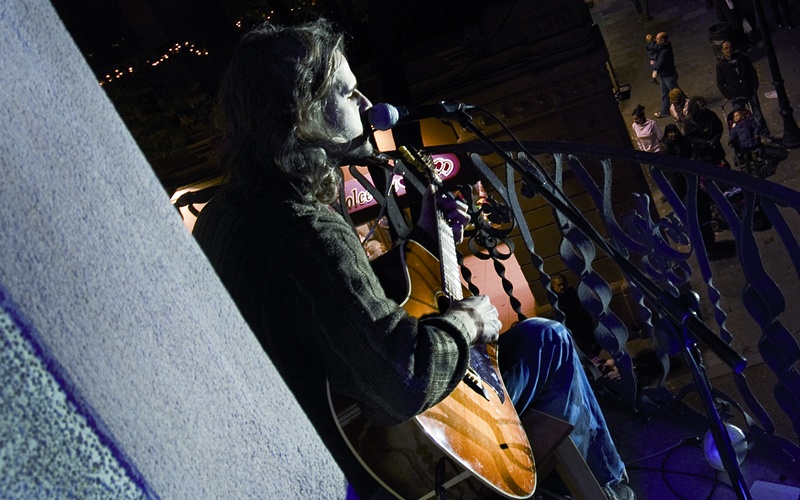
© Albert Armengol
Poet Sílvia Bel with the book she has published thanks to financial support received through Verkami.
In December 2010 the Sala family received the gift of a good idea: to create a platform to provide financial support for artistic creativity. Joan, a trained biologist, and his two sons – Jonàs, a physicist, and Adrià, an art historian – pooled their varied knowledge and rolled up their sleeves. They were united by one thing: all three are passionate about creativity.
And thus Verkami was born, inspired by the Kickstarter platform that was developed in the United States a year and a half previously. The Sala family’s idea was to transport this initiative. “There was nothing similar in Europe or in South America, and it all started with our own desire to shoot a short film for which we needed funding,” recalls the elder of the sons, Jonàs Sala.
At the time of writing, 280 projects have been funded, with a 72% success rate, and Verkami’s home page proclaims an ambitious initiative: to fund the newspaper El Público with 30,000 euros. A sum of 14,000 euros has already been secured with 25 days remaining for making donations. That is how it works: people pitch their project and have a 40-day deadline to get the money they need from user donations. The creator has to come up with a way of giving them something in return and this is where the most original ideas emerge: “One group even offered to play at your wedding if you gave them a sum of money to fund their first record,” says Jonàs Sala.
For the initiative to be successful, the elder of the Salas believes that it is essential to “know how to get your idea across and address your potential audience, bearing in mind that they are not moneyed people who do it for philanthropic reasons; they are consumers like us, who want to see works that interest them. People don’t pay more for a DVD or for a book, especially if they haven’t been made yet. You have to know how to convey trust and understand that, because you are cutting out the middlemen, you can offer your products at a better price.” Another piece of good advice is to pay attention to the communication aspect and to use every possible channel, both social networking and blogs. “Crowd-funding is a good tool, but it demands a bit more from creators, and that is dissemination. Some of them are not used to it,” says Sala.

© Pere Virgili
Lleida-born musician Jordi Gasion launched the fourth Music from a Balcony Festival on Plaça del Comerç, Sant Andreu, in December 2011. This edition of the festival was funded via Verkami.
Someone who is used to it is the poet Sílvia Bel, who has just published her new book with funds secured through Verkami. She is full of praise for the experience. “I wanted to bring out my second book of poems accompanied by the music of Clara Peya, but including a CD in a book makes it very expensive. The publishers couldn’t cover the cost. In the end, I found a way: by putting it in QR codes. But of course the expensive part was the recording. And it was then that I decided to use Verkami to pay the whole multimedia part of the project. The whole experience was very enriching and it really made the project grow, above all because it was a way of beginning to disseminate the book. Day by day you can see how the donations from sponsors continue to grow – I call them my angels – and it is very stimulating to feel that they believe in it, are excited about it and want to support it.”
“The strength of micropatronage lies in the fact that participants help the artist directly”
But Bel has also been very conscious of the work involved. “Getting people excited about a project like this also carries a great responsibility and commitment. I now feel like I’m engaged to be married to 80 little angels. It is they who have given me wings. They and the publishing house, whom I thank for the freedom and absolute trust they have given me to carry out the musical and videoclip part. I think I’ve put in nearly a hundred acknowledgements to different people in the book. I hope I haven’t left anyone out!”
This poet now has direct experience of the world of crowd-funding and warns that “the Ministry of Culture wants to regulate micro patronage. I think they’re mistaken. The strength of micro patronage lies in the fact that whoever does it feels that they are directly helping the artist, without any middlemen or regulations to follow. I don’t know how long this system will last. Obviously, people cannot and should not have to finance every project that comes up ad infinitum, especially because we pay taxes. All I hope is that it doesn’t end up becoming a political tool. If we reach a ceiling, we’ll find a way of turning it into something else! I think that artists have led the way.”
Because of this, the multimedia book Fila índia enfora (Outside Single File), along with hundreds of other initiatives, is now a reality.



